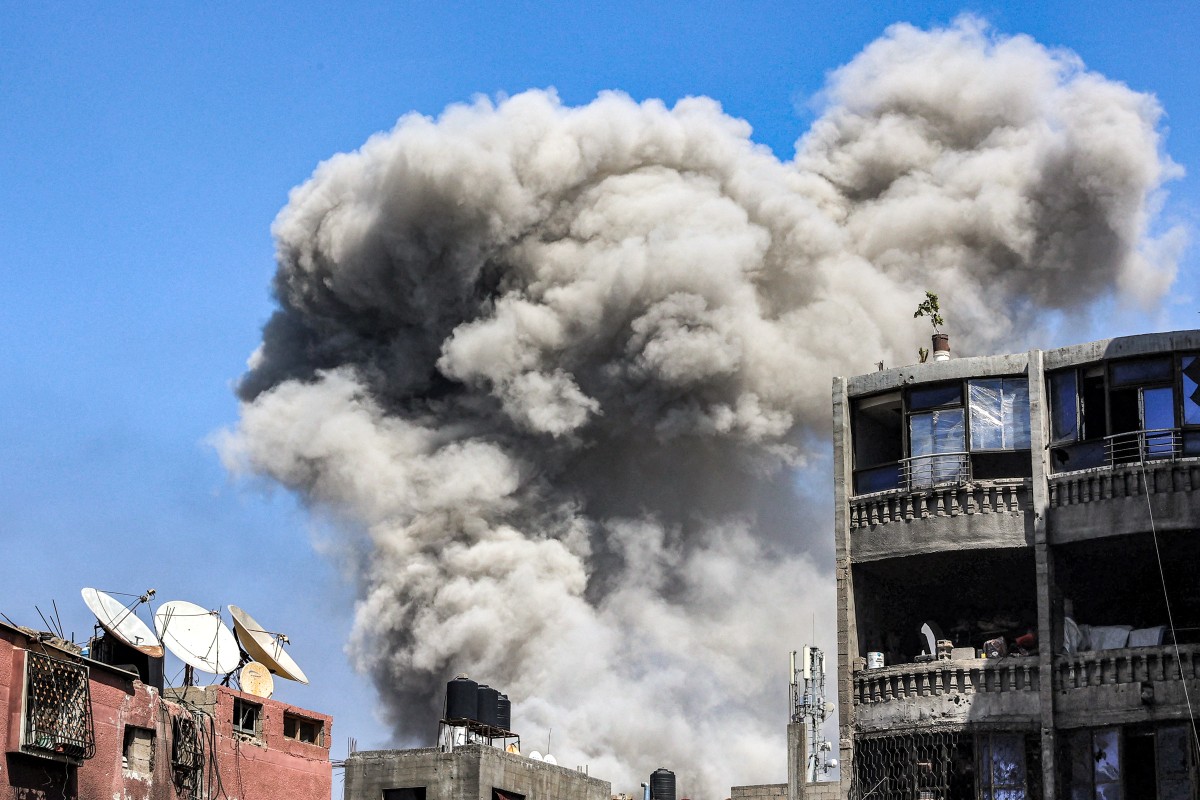Rafah, Palestinian Territories – Israeli troops fought Hamas fighters in multiple battles across the Gaza Strip Tuesday that forced new waves of Palestinian mass displacement, on a sombre Independence Day for Israel.
Clashes have rocked the densely crowded far southern city of Rafah but also flared again in northern and central Gaza months after troops and tanks first entered those areas.
US State Department spokesman Vedant Patel on Tuesday said that while Washington backed military pressure on Hamas, it was not the only way to “fully defeat” the group.
Patel reiterated Washington’s position that, without a political plan for Gaza’s future, fighters “will keep coming back and Israel will continue to remain under threat”, leading to “this continued cycle of violence”.
Israel last week defied a chorus of warnings — including from top ally Washington which paused a shipment of bombs — and sent troops and tanks into the east of Rafah to pursue fighters.
At the same time, fighting has flared in north Gaza four months after the army said Hamas’s command structure there had been dismantled, and six months after Defence Minister Yoav Gallant said Hamas had “lost control” of the Palestinian territory.
Battles and heavy Israeli bombardments have been reported around Rafah as well as in Gaza City and Jabalia refugee camp in the north, and Nuseirat camp in the centre.
At Gaza City’s Al-Ahli hospital, the wounded and the dead arrived.
A shirtless man, his chest smeared with blood, lay on a hard cot hooked up to a monitor. Outside, several men carried a shrouded corpse and placed it in the shade of a tree blooming red flowers.
One-quarter of Gazans flee
More than seven months into the war, another 82 people were killed in Gaza over the past 24 hours, the health ministry in the Hamas-run territory said.
That is the highest daily toll reported by the ministry in more than two weeks.
Nearly 450,000 Palestinians have been displaced from Rafah since May 6, and around 100,000 from northern Gaza, UN agencies said.
That means around a quarter of Gaza’s population of 2.4 million people have been displaced again in about one week.
UN chief Antonio Guterres is “appalled” by Israel’s escalating military activity in and around Rafah, a spokesman said Tuesday.
“These developments are further impeding humanitarian access and worsening an already dire situation,” Farhan Haq said, also criticising Hamas for “firing rockets indiscriminately”.
In the Israeli city of Sderot, on the edge of northern Gaza, Israelis ran for cover inside a supermarket when sirens warned of rockets launched from Gaza.
Further north, rockets fired from Lebanon killed a civilian and wounded five soldiers, Israel’s army said.
Israel’s offensive has killed at least 35,173 people, mostly civilians, according to the Gaza health ministry.
Israel’s military says 272 of its soldiers have been killed in the Gaza campaign since ground operations began.
Aid trucks ransacked
Momentum had been building in truce negotiations, the prime minister of mediator Qatar said on Tuesday, but “what happened with Rafah has set us backward”.
Prime Minister Mohammed bin Abdulrahman Al-Thani said that “right now we are on a status of almost a stalemate”.
Egypt and the United States have also been mediating.
“There is no clarity how to stop the war from the Israeli side. I don’t think that they are considering this as an option,” Sheikh Mohammed said.
Since Israeli troops moved into eastern Rafah, the aid crossing point from Egypt had remained closed and nearby Kerem Shalom crossing lacked “safe and logistically viable access”, a UN report said late on Monday.
Qatar said Gazans “have not received any aid” since May 9.
On Tuesday Israeli police said they have opened an investigation after right-wing activists stopped and ransacked at least seven Gaza-bound aid trucks coming from Jordan, leaving food spilt on the road while famine threatens Gaza.
One of the activists, Hana Giat, said that with hostages still held by Hamas, “no humanitarian aid should go in before our hostages are out, safe in their homes”.
Both the United States, which called it “a total outrage”, and Britain, said they would raise concerns about the incident with Israel’s government.
They ‘blew up’ village
The United Nations said an Indian member of its security services was killed and another wounded when a UN vehicle was struck on the way to a hospital in Rafah.
The UN said it had informed Israeli authorities of the vehicle’s movements.
Israel’s military said the strike was “under review” and that an initial inquiry “indicates that the vehicle was hit in an area declared an active combat zone”.
Human Rights Watch said it had identified eight occasions since the war began when Israel had targeted known aid worker locations in Gaza, after their coordinates were shared to ensure their protection.
On Tuesday Israel marked Independence Day, commemorating the state’s creation in 1948.
Like many Israelis, Lishay Lavi Miran expressed mixed feelings.
With her husband, Omri, still among the hostages, “it’s not really independence”, Lavi Miran said, even though other family members are “still here, and Israel is still here”.
Palestinians remember Israel’s establishment as the “Nakba”, or catastrophe, when around 760,000 Palestinians fled or were driven from their homes during the war that led to Israel’s creation.
On the eve of the commemoration on Wednesday, thousands took part in an annual march that took them through the ruined villages.
Eyes glistening with tears, Abdul Rahman al-Sabah, 88, recalled how members of the Haganah, a Zionist paramilitary group, forced his family from al-Kassayer and “blew up our village”.








